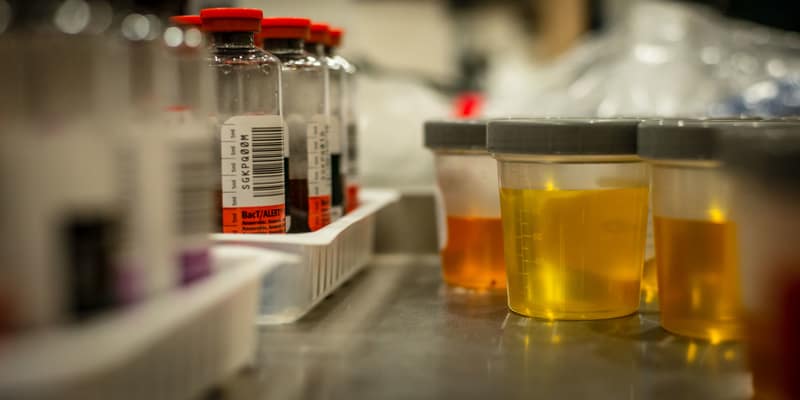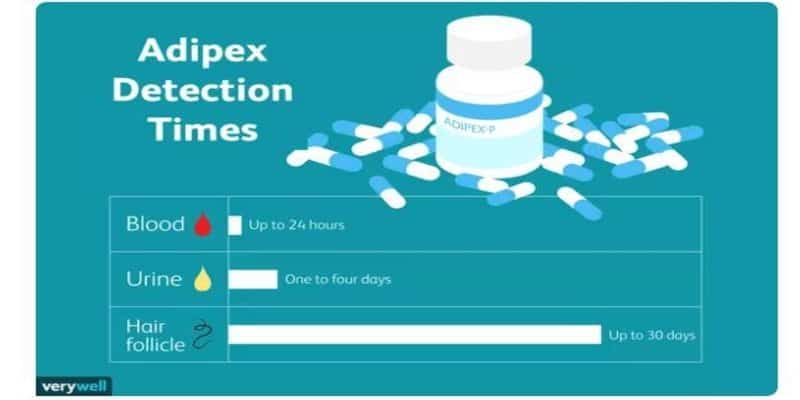Will Phentermine Show on a Drug Test?
Max Health Living is a reader-supported site. Purchases made through links may earn a commission. Learn more.
Many people have questions about phentermine and drug tests.
Some of these questions are about whether it is safe to use phentermine if you plan to take a drug test, and others are concerned that the drug may cause a false positive test.
Phentermine is an amphetamine-like prescription medication with similar chemical properties to other stimulants such as cocaine or methamphetamine.
Because of this, some drug tests may detect its presence in your system as an amphetamine.
This article discusses what happens when someone takes phentermine, how it affects drug testing, how to avoid being flagged at work if you have taken phentermine before, and what alternative medications may have fewer side effects.
How Will Phentermine Show Up in a Drug Test?
Phentermine is an appetite suppressant that is only available on prescription.
Normally, it should not appear on some drug tests. However, phentermine can give a false-positive urine test result because of its chemical similarities with amphetamine.
Amphetamine is among the few brain stimulants. Athletes often use this drug to boost performance. For this reason, this drug is now restricted to medical use only due to its addictive properties.
Phentermine has an identical chemical structure to amphetamines.
A urinalysis test would reveal amphetamine if performed a few hours or a day after ingesting phentermine. The result is classified as a false-positive test result. In a situation of a false-positive test with amphetamine, you should provide your doctor’s phentermine drug prescription to the testing officer.
Your employer or the medical office in charge of the testing procedure will need the prescription list to declare the test result negative. Otherwise, if you’re applying for a new job, this might get you disqualified.
Your medical examiner may also perform phentermine confirmatory tests.
The test will help distinguish phentermine from other amphetamines or methamphetamines.
What Drug Tests Will Show Phentermine?

You may wonder what type of drug test shows phentermine.
Basically, any drug test is designed to detect the presence of certain substances in the blood, urine, and other body fluids. These substances are called metabolites and are released after the body breaks down the drug to be tested.
Most drug tests procedure look for the presence of controlled substances. It screens the urine, blood, or other body fluid for opiates, cocaine, amphetamine, phencyclidine (angel dust), Tetrahydrocannabinol (THC), etc.
However, since phentermine has an organic component similar to amphetamine, it can only show a false-positive result for amphetamine drug screen tests.
These are:
1. 25-panel urine test
The 25-panel urine drug test tests amphetamines, methamphetamines, zolpidem, cocaine, opiates, oxycodone, and many others. It is not designed to test for phentermine.
However, it can reveal a false-positive result because of the similar properties between phentermine and amphetamine. Five-, ten- and 15-panel tests can also be used.
A confirmatory test using GC-MS or LS-MS will help distinguish between phentermine and amphetamine.
2. Hair drug testing
Phentermine’s presence can also be checked by using a hair sample. This test focuses on detecting phentermine metabolites. Hair drug tests are the most accurate ways to test for the use of phentermine. Phentermine in the hair remains for a longer time than in the blood.
Hair testing detects the presence of the drug in your system for up to 30 days following your last use. It is also used to screen for other controlled or banned drugs.
3. GC-MS testing
A Gas chromatography Mass spectroscopy test is used as a confirmatory test for phentermine after a urine test. Many employers use it as a second-step test to screen their employees.
The examiner may carry out a GC-MS test to confirm that you have taken phentermine, not amphetamines.
This test will determine if traces of synthetic amphetamines are found in your urine sample. The results of this test can then be used as evidence by law enforcement agencies to prosecute people taking phentermine without a prescription.
The other type of suitable confirmatory test is the liquid-chromatography mass spectrometry test. Both LS-MC and GS-MC can effectively test for other drugs aside from phentermine.
How Long Can Phentermine be Detected in your Body System?

In a normal body condition, it will take 5 to 7 days for all phentermine and its metabolites to be eliminated from the system. Phentermine has a half-life of about 20 hours which is the time it will take half of the dosage will be used up in the body and excreted with the bodily fluid.
Phentermine takes about 5-7 half-life cycles to completely eliminate it from your body.
However, some factors may prolong or delay the metabolism of phentermine in your body.
Such factors include:
- Age:
The rate at which phentermine is metabolized may be lower in adult males than in adult females. The reason for this is unclear, but it may be due to variations in sex hormones that affect how quickly the body converts methamphetamine-like compounds into inactive forms.
- Dosage:
If you take more phentermine than prescribed, it will take more time for it to be completely eliminated from your body. Overdose of phentermine can be fatal with side effects like hallucinations, seizures, slow breathing, etc.
- Individual Urinary pH:
Some individuals have more acidic urine than others, which can slow down the rate at which phentermine is broken down and removed from your body. This is because phentermine is highly acidic, and when you pee, it reacts with the acids in your urine to form a salt harder to remove.
- Individual Body Metabolism:
Your body’s metabolism is the rate at which it processes and uses food, water, and other substances to sustain life.
Your genetics, age, medical history, and other factors can affect how quickly your body burns calories. Phentermine is cleared from the body by the kidneys and liver. If these organs aren’t functioning properly, it could take longer for phentermine to be removed from your system.
- Interaction with other drugs:
Phentermine is metabolized by an enzyme called CYP2D6, which can be inhibited by some other medicines, including tricyclic antidepressants (TCAs), and monoamine oxidase inhibitors (MAOIs), and beta-blockers. If you take any drug with these active ingredients, phentermine may stay longer in your body fluids.
- Other health conditions:
Other conditions that may have an effect on your metabolism include diabetes, kidney disease, and thyroid disorders such as hypothyroidism (underactive thyroid), hyperthyroidism (overactive thyroid)
To avoid being flagged after getting a false-positive result, ensure you have the doctor’s prescription for this drug ready before the test.
Preferably, you can opt-in for other appetite suppressants that do not appear on urine tests.
How Can I Pass the Drug Test for Phentermine?
The drug test that will be administered to check for the presence of amphetamines may give a false positive test for phentermine. In this case, you’d be required to present a valid doctor’s prescription for phentermine since it’s a controlled drug prescribed by doctors only.
The only time you would be at risk of legal action when taking a phentermine test is when you use phentermine without a prescription.
Aside from the legal implications, using phentermine without a prescription is particularly risky because of the possibility of overdose.
Taking Adipex and other phentermine-containing medications can lead to addiction or a stimulant use disorder.
Therefore, prevention is always better than cure to pass a drug test for phentermine. It is best to avoid phentermine altogether if you cannot safely obtain it. However, alternatives have many advantages over phentermine if you need it for weight loss.
PhenQ is an all-natural weight loss solution that doesn’t require medical supervision.
It contains ingredients such as Capsimax powder, Chromium picolinate, and more to trigger natural weight loss for a slimmer look and feel. This supplement has been seen in clinical studies to boost energy, suppress appetite, improve metabolism and burn fat daily with no negative side effects.
PhenQ pushes your body to new limits and levels of greatness as it controls your appetite and keeps you happy and energetic.
It also uses safe, legal natural ingredients that help decrease the effects of stored fat in your body.
Check here to learn more about the PhenQ weight loss supplement.
FAQs about Phentermine and Drug Test
Will Phentermine show up On Urinalysis Test?
Phentermine shows up on drug urinalysis. It can cause false positives when testing for other substances like amphetamine in your urine. Phentermine is metabolized by the body into an amphetamine-like substance.
When people use phentermine as an appetite suppressant, they experience increased water retention and increased concentration of amphetamine-like metabolites in their urine.
The amphetamine drug test looks for the presence of amphetamine metabolite in a body fluid.
They can, however, record the metabolite of phentermine as a false positive.
To avoid being penalized, you must provide a valid prescription written by a doctor. However, there are prescription-free alternatives to phentermine, such as PhenQ, which has been proven safe and effective for weight loss.
Is Phentermine a Narcotic?
Phentermine is a prescription weight-loss drug that has been approved by the U.S. Food and Drug Administration (FDA) to treat obesity in adults.
The FDA has not specifically designated phentermine as a narcotic but as a central nervous system stimulant. However, some people who use phentermine for weight loss have reported feeling high or “drugged” after taking it.
Phentermine is a schedule IV drug that has the potential for abuse.
The U.S. Drug Enforcement Administration (DEA) classifies phentermine as a controlled substance because of its potential for abuse and dependence. The DEA does this because it can be used in the illegal production of methamphetamine or other drugs or in the illicit distribution of methamphetamines.
Will Adipex show up on a drug test?
Phentermine-containing drugs like Adipex used to lose weight commonly cause false positives on drug tests.
The reason is that they contain an amphetamine metabolite that can show up as amphetamine. This can cause false positives on drug tests even if the person being tested is not on any medications that would cause this problem.
Adipex is one of the most commonly abused prescription drugs in the United States and potentially the most dangerous. Although it is prescribed for obesity, some people use it recreationally and get addicted.
Those who abuse Adipex may experience withdrawal symptoms when they stop taking it.
To avoid being penalized for using the drug illegally after a drug test, you must present your phentermine prescription from a qualified medical practitioner.
Alternatively, you can try phentermine alternatives that don’t appear on drug tests and have little-known side effects.
Will Phentermine show on an opiate or cocaine test?
Opioids are very strong painkillers used for short-term pain management. Similar to cocaine, they are highly addictive and strongly regulated.
A five-, ten-, or fifteen-panel drug test may be required to detect the illegal use of these two drugs.
Opiates, amphetamines, and cocaine are all part of a 5-panel drug test. Using this method, a test for opiates or cocaine will also reveal a false-positive result for phentermine. This is because of the chemical similarities between amphetamine and phentermine.
However, when the drug testing is done for the two specific drugs, the test will not detect phentermine. The LC-MS/MS method that detects cocaine and opiates will not be disturbed by phentermine’s presence.
Final Thoughts
So, will phentermine show up on a drug test?
The answer is that it depends.
If you’re taking phentermine, it’s important to be aware that the drug can show up on some drug tests.
If prescribed by your doctor and you have a normal urine drug screen, then it is unlikely that the medication will be detected.
However, if you are taking larger doses or for an extended period of time, then there is a greater chance that the drug will be found in your system.
Additionally, phentermine may give you a false-positive urine test result for amphetamines. If you are taking phentermine and need to take a drug test, be sure to tell the person administering the test so they can use an appropriate method for detecting this medication.
Important Disclaimer: The information contained on MAX HEALTH LIVING is intended for informational and educational purposes only. Any statements made on this website have not been evaluated by the FDA and any information or products discussed are not intended to diagnose, cure, treat, or prevent any disease or illness. Please consult a healthcare practitioner before making changes to your diet or taking supplements that may interfere with medications.
Who We Are

We are a team of fitness, health, and supplement experts, and content creators. Over the past 4 years, we have spent over 123,000 hours researching food supplements, meal shakes, weight loss, and healthy living. Our aim is to educate people about their effects, benefits, and how to achieve a maximum healthy lifestyle. Read more.




